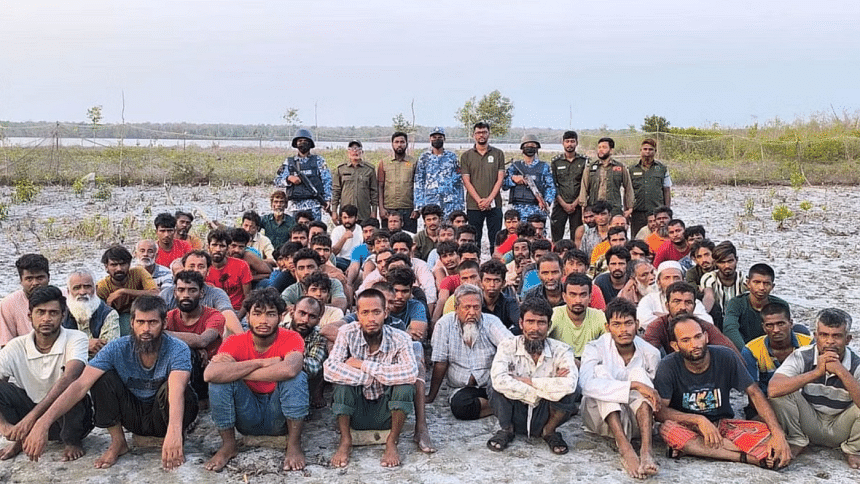India pushes in 300 people in 3 days, sparking security concerns in Bangladesh

Amid rising tensions following a terrorist attack in Kashmir's Pahalgam and retaliatory strikes between India and Pakistan, India's Border Security Force (BSF) pushed more than 300 people into Bangladesh between May 7 and 9 through several border points in six districts.
According to the Border Guard Bangladesh (BGB), police, and local administration, those forced into Bangladeshi territory include not just Bangladeshi nationals but also Rohingya individuals and Indian citizens.
The situation raises pressing questions—how justified is India's decision to push these individuals across the border citing Bangladeshi origin?
Why is this complex not following any formal process?
This began when India was involved in an armed conflict with Pakistan.
What message is India trying to send to Bangladesh? And how should Bangladesh respond?
On Wednesday, National Security Adviser Khalilur Rahman, said, "We are reviewing each case individually. Our decision is clear—if anyone is proven to be a Bangladeshi citizen, we will accept them. But it must happen through formal channels."
"Such push-ins are not the correct procedure," said Khalilur, also the interim government's high representative on Rohingya issues.
The next day, on May 8, the foreign ministry sent a letter to India, expressing deep concern and urging an immediate halt to such activities.
"For the sake of peace and stability along the Bangladesh–India border, such push-ins are unacceptable," the letter said.
Observers believe the recent push-in attempts are deliberate, considering the shifting political landscape in post-uprising Bangladesh and the recent conflict between India and Pakistan.
Such acts pose a serious security risk and generate negative public sentiment.
Violating bilateral border management procedures, these actions contradict the 1975 India–Bangladesh joint border guidelines, the 2011 Coordinated Border Management Plan (CBMP), and decisions taken during director general-level talks between BGB and BSF, according to a foreign ministry official.
The Daily Star spoke with several experts on this issue, including political thinker Farhad Mazhar, former diplomat and ex-Bangladesh ambassador to the US M Humayun Kabir, Southeast Asian history researcher Altaf Parvez, former Dhaka University international relations professor Imtiaz Ahmed, and migration expert Asif Munier.
They noted that the push-in and push-back issues are not only about security but also human rights and international relations.
They also believe such actions create fear and uncertainty in the lives of border residents, and thus, a swift resolution is essential.
Push-ins 'deliberate, inhumane'
Poet and thinker Farhad termed the recent push-in incidents along the India-Bangladesh border as "deliberate" and "inhumane", warning that they are part of a larger political design amid rising regional tensions.
"In a climate of war and communal hostility, India appears intent on triggering some form of border conflict," he told The Daily Star.
According to Farhad, there is now an effort to construct a narrative that links militants from Pakistan with unrest on the Bangladesh-India border.
"They want to prove that due to Pakistan's ties with Bangladesh, so-called Pakistani militants are crossing the border. The political setting for such a story has already been built in Bangladesh," he said.
Farhad suggested forming a national security council with the Army Chief Waker-Uz-Zaman and relevant stakeholders to address the issue.
Researcher Altaf echoed this view, recommending an all-party meeting to guide the interim government's response.
Farhad also questioned why individuals with political affiliations are allowed to stay in India without legal status.
"There are so many Awami League leaders and activists living there. None of them went through legal channels. Why aren't they being sent back?" he asked.
Commenting on the legality of the push-ins, he said, "Pushing in people is a gross violation of human rights. If someone enters a country illegally, there are laws to deal with that. The host country should inform the other government. Skipping these steps and forcibly sending people across the border is an inhuman act, especially during a time of geopolitical instability."
Former diplomat Humayun Kabir said India should follow established protocols.
"If they believe some individuals in India are illegal Bangladeshi nationals, they should inform Bangladesh. The government here will verify and decide. That's the standard process," he said.
"But often India avoids this process and pushes people out based on suspicion. This isn't new, but the scale now is worrying," Humayun added.
On what Bangladesh should do, he said, "We must register our formal protest. If India doesn't respond, we have the right to push back those who aren't Bangladeshi. We should tell Indian authorities to avoid using such channels."
He warned that continued disregard for procedure could hurt bilateral relations.
"If this continues, it could have a negative impact on ties between the two countries. That too must be conveyed clearly."
India's action 'well-planned and deliberate'
Researcher Altaf Parvez echoed Farhad Mazhar's concern, describing India's recent push-in operations as a "well-planned and deliberate move".
"This is not happening at one single point," he said.
"Push-ins are taking place at multiple locations along the border. That clearly indicates coordination and intent. It's a designed operation on India's part. Those who were pushed in have confirmed that many more have been gathered on the other side, waiting. This shows a conscious strategy by India."
Altaf also pointed to the timing of the incidents.
"These push-ins began on the same day India launched attacks in Pakistan. Naturally, people in Bangladesh are worried. Reports suggest some of those pushed in were brought from Gujarat — the far western edge of the subcontinent. To bring them all the way to a place like Khagrachhari and push them in — that has to be a highly coordinated act."
Like Farhad, Altaf noted that there is no indication India informed Bangladesh about the presence of any undocumented Bangladeshis on their soil.
"We've seen no evidence that India officially said these individuals were illegal Bangladeshis, or that there are so many of them. So, the fact that they carried out this action on the same day as their Pakistan strikes — and across several border points — makes it not only alarming but also provocative."
He warned that India may be trying to create sustained military tension along the Bangladesh border through such actions.
"No sovereign state would accept groups of people being pushed in without warning or formal communication. Naturally, any government would respond with push-backs. While that may appear inhumane on the surface, Bangladesh is a state, and this is a matter of national security. If both push-in and push-back operations begin, tensions will rise along the frontier — and India surely knows that this is a likely outcome. Their move appears to be a first step towards that."
Altaf recommended that the interim government immediately convene an all-party meeting to determine the course of action.
"This is a national security issue," he said.
"The way the government is handling push-ins and the humanitarian dimension, without calling such a meeting, is risky. An unelected government is not in a position to deal with this on its own.
"By engaging all political parties in discussions, the government could strengthen its political footing — which is urgently needed, especially in the absence of a parliament," he added.
'New Delhi's strategic move'
Political platform Rashtra Sanskar Andolon condemned the May 8 push-in incident, calling it "a deliberate and coordinated action by India" to exert geopolitical pressure on Bangladesh amid its tensions with Pakistan.
"This isn't an isolated event," the group said in a statement.
Prof Imtiaz said an immediate flag meeting between the BGB and the BSF was essential.
"The first step is to determine the nationality of the individuals," he said.
"If they are Bangladeshi citizens, it is Bangladesh's responsibility to take them back. If not, then Bangladesh must clearly say so at the flag meeting."
He raised a further concern, "What happens if they are Rohingya? India cannot just push them into Bangladesh. If they are to be sent anywhere, India should send them to Myanmar.
"India has better relations with Myanmar than we do. Bangladesh hasn't taken responsibility for all Rohingya people in the world," he said.
Imtiaz added that if the flag meeting fails to resolve the matter, the issue should be intensified.
"Even summoning the Indian high commissioner might be necessary. And if needed, the matter can go up to the foreign secretary level."
When asked whether Bangladesh has contacted India officially over the matter, National Security Adviser Khalilur said on May 7, "We are trying to engage with the Indian government."
Imtiaz stressed that engagement must happen quickly.
"The Indian high commissioner is based in Dhaka, so arranging a meeting should not be difficult. If he says the issue is beyond his mandate, then the matter should go further up. A simple phone call could also work — there's no reason to delay."
Migration expert Asif Munier said instability in a neighbouring country will inevitably affect the border.
"Given the diplomatic ties between Bangladesh and India, this must be resolved through diplomatic channels as well as through both countries' border forces."
He also warned against seeing the push-in incident as isolated.
"This may rise further. A rapid response and proper planning are now urgently needed."
Translated from Bangla by Arshi Quazi

 For all latest news, follow The Daily Star's Google News channel.
For all latest news, follow The Daily Star's Google News channel. 



Comments